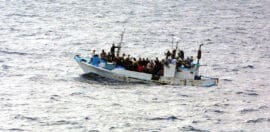Global refugee crisis prompts calls for policy rethink

21 June 2019 at 4:05 pm
NGO leaders say Australia must seriously rethink its refugee policy and increase its humanitarian intake after it was revealed more than 70 million people were forced to flee their homes in 2018.
The UN Refugee Agency’s (UNHCR) annual Global Trends report found 70.8 million people were forcibly displaced last year, the highest number in the organisation’s almost 70-year history.
This figure also represents a 2.3 million person increase from the previous year and is double the number of refugees 20 years ago.
Australia for UNHCR national director Naomi Steer said this was a crisis overwhelmingly affecting kids, with more than half of all refugees now children and many of them fleeing alone.
“At least 138,600 children are fending for themselves as they flee conflict without parents, and this is likely an underestimate,” Steer said.
“In Uganda, where Australians have supported UNHCR’s humanitarian operations for many years, a staggering 2,800 children aged five or below arrived in refugee camps on their own.”
Australian NGO leaders have used these figures to call on the nation to step up its efforts to protect the world’s most vulnerable.
Violet Roumeliotis, CEO of Settlement Services International, said Australia needed a generous refugee intake to bolster its humanitarian approach.
She noted that earlier this year, the federal government announced plans to freeze Australia’s humanitarian intake, which accounts for less than 5 per cent of the nation’s annual migration program.
“A community sponsorship program like we see in Canada or the UK would be a great supplement to our current humanitarian program,” Roumeliotis said.
“It’s something that could really make a difference in the lives of people who are forcibly displaced. Australia currently has a similar program, but there are a number of key differences between our model and what is working overseas, which may hinder take up from community.”
Roumeliotis said it was only four years ago that the government agreed to resettle an additional 12,000 people in response to the conflict in Syria and Iraq.
“With one action, we lived up to our reputation as a leading global citizen and helped thousands of children, women and men who were forced to leave behind their friends, family and everything they know in order to live a life that is free from war or persecution,” she said.
“SSI was involved in that resettlement on the frontline… and the results speak for themselves.
“Refugees from that intake are now well on the way to successful settlement – forging friendships, engaging in education, starting businesses – making economic, social and cultural contributions to their new homes.”
According to a Nine-Fairfax report, the Australian government will put a higher priority on migrants from South America, amid a humanitarian crisis in Venezuela which has reportedly created a 4,000 per cent increase in Venezuelans seeking refugee status since 2014.
In wake of the latest figures from UNHCR, The Refugee Council of Australia (RCOA) has urged the government to turn its focus from harsh deterrence policies to “positive and solutions-focused diplomacy”.
RCOA CEO Paul Power said the number of refugees and people seeking asylum was continuing to grow because so few were able to find effective solutions for their displacement.
He said the number of refugees resettled globally last year was just 92,400, the lowest number for six years and less than half of the number resettled in 2016.
“In Australia and many other countries, we see political leaders scaremongering about movements of refugees and yet doing too little to offer constructive alternatives for refugees who cannot find protection,” Power said.
“The resettlement of 12,700 refugees to Australia was a helpful contribution but far too modest given Australia’s capacity and global needs.
“Australia should be working with other nations to reverse the dramatic reduction in refugee resettlement over the past two years [and] work with other nations to find alternative solutions for refugees.”







